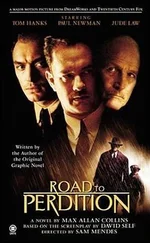“I understand,” Pat said, apparently mollified.
Privately, however, Reddy admitted to Michael that the US Army did not hold out much hope for Lieutenant Satariano’s return — apparently, WITSEC had checked the missing soldier’s status, as a matter of course.
“How frank you want to be with your wife,” the agent said, “I’ll leave up to you... You might not want to put her under any more pressure right now than necessary.”
Reddy also told Michael, privately, that exceptions were often made to the “no contact” policy where parents and grandparents were concerned. Letters could be forwarded on, sans return address, and even phone calls arranged through a Justice Department switchboard; but since both Michael and Pat had lost their parents, this service would only be made available, discreetly, to Pat... should she want to maintain contact with her sister, Betty.
Pat and Betty were not close — the once wild Betty was now a Republican, and married to a born-again pastor — but “Mrs. Smith” did arrange for one call to be made, just to keep Betty from being concerned.
The biggest problem, of course, was Anna, who was going steady with a boy named Gary Grace.
“You’ll have to watch her like a hawk,” Reddy said. “She is a teenager.”
“No kidding,” Michael said. “Can’t she even write the kid a goodbye letter?”
“We advise not. Make it a clean break. Right now.”
“Do you have any kids, Agent Reddy?”
“Why, yes.”
“How old?”
“Grade school — third and sixth.”
“Why am I not surprised?”
“Until she’s twenty-one you can control her, of course, and...”
“You really don’t have teenage kids, Agent Reddy.”
“...And if you want to allow her to write the boy, her letters will have to be read by both you and your wife, and by WITSEC personnel. There can be no hints of where your daughter has moved.”
“I understand. Let’s not even give her that option.”
“That’s a good call, Mr. Smith. A very good call.”
Another trauma dropped at their feet was the need to make a legal name change. They wouldn’t just be pretending to be the Smiths; they would legally be the Smiths... Satariano no more.
Shore himself explained this to Michael: “We can’t have you lying when you fill out legal documents, real estate documents, for instance, or loan papers. The Justice Department can’t be party to fraud. You will have to use your real name... which is now Michael Smith.”
Court records would be sealed, protecting the old and new identities alike. Pat and Anna hated this whole legal-name-change thing, though Michael didn’t really care. He’d been through it before.
The intensive combination briefing and debriefing lasted almost two weeks. Toward the end a stream of new official papers flowed: birth certificates, Social Security cards, driver’s licenses, even school and college transcripts. The Smiths had history.
They had documents.
They were real.
Pat and Anna were in a better mood working at memorizing their new backgrounds than they’d been watching TV, a hotel-room existence which had in particular begun to bore Anna, whose every other sentence was a report of what would be going on back home (“Prom committee is meeting now — right now !”). That, and “I can’t believe that The Waltons is the best thing on!”
Michael was not told who he’d first be testifying against, and in what trial, just that it would be at least six months before he had to take the stand, though thereafter he’d likely be involved in at least one trial a year for the foreseeable future. Just having a foreseeable future seemed a good start to Michael.
He would testify as neither Michael Satariano nor Michael Smith, rather as “Mr. X.”
Suddenly I’m starring in a Saturday afternoon serial , he thought.
That the government had been able to make Michael the manager of a restaurant that Uncle Sam owned (due to an IRS takeover) made it particularly easy for their witness to miss work. He had no monthly stipend from WITSEC because the restaurant salary (forty thousand dollars a year) outstripped it.
The meetings with Shore in Phoenix would be occasional, perhaps once a month, never longer than a single afternoon. Shore had to fly in from DC for these, and Michael was only one of dozens, perhaps hundreds, in WITSEC the associate director was dealing with.
“We’re going to let you hang on to that .45 auto of yours,” Shore advised Michael, on the first of these Phoenix confabs.
“It’s sort of a family heirloom,” Michael said, unaware they knew he’d kept it. Did they know about the half-million, too?
“I can understand you wanting some protection at hand,” Shore was saying, “but no other guns, Mike. Don’t make your new home a fortress or an arsenal. If you have a problem, if you have any suspicion that you’ve been made, let us handle it.”
“Harry, all due respect — you don’t even have an office in Tucson.”
“No, but I can send a marshal, straightaway. One thing they have plenty of in Arizona, Mike, is marshals. You’ll have a ‘panic number’ to call.”
“Let’s say I call it. What happens then?”
Shore shrugged. “Marshals will swoop down, and you and your family will be whisked away to safety again.”
“What... to start over? New names and...?”
Shore’s nod was somber. “Yes, Michael. You may have to relocate several times. We hope that won’t be the case, and we haven’t broached the subject with your family... But it may happen.”
“Christ.”
“But know this: we’ve never lost a witness or a family member in WITSEC. Never.” The awful smile formed. “We wouldn’t be in business long if we did.”
Michael was shaking his head, a sick feeling in his belly. “I’d feel better if you were using FBI, not these damn marshals.”
Marshal Don Hughes was not in the room with them; he was in the bedroom next door, but did not sit in on the conversations between Shore and Michael.
The WITSEC director’s face dropped in disappointment; he almost looked wounded. “Michael, they’re good people!”
“Harry — you and I both know that these marshals are the bottom of the Justice Department barrel. Just because you’re sending us to Arizona, don’t go thinking this is my first time at the rodeo.”
“Our marshals have—”
“No standards for employment — they’re former city cops or sheriff department deputies with enough political clout to land themselves a federal plum... Am I lying, Harry? Or exaggerating?”
Shore’s normal shit-eating grin was nowhere to be seen. “No. No, Michael, you’re not. But I handpick these men, from what’s available.”
“From what’s available.”
“I go over their records, thoroughly. We have the best of—”
“A bad crop? Harry, just know this: if you can’t protect my family, I will.”
Shore leaned forward. “I can protect them, Michael. I can protect you and them .”
“Okay, then.” He smiled just a little and locked eyes with the fed. “I’ll do my end of the deal. You better do yours.”
Breathing deep, Shore reared back. “You know, Michael... with all we’re doing for you? I don’t think threats are called for.”
“With all I’m doing for you, Harry? I do.”
So only a little over two weeks after their midnight exodus from Crystal Bay, the Michael Smith family walked into a living room set up remarkably like their previous one had been. Even the layout of the house was similar, right down to a patio off the kitchen with a pool.
Anna had taken time out between bitch sessions to take her father by the arm and, in a little-girl voice, say, “Daddy, it’s weird — it’s so weird. I feel like a ghost, haunting my own house.”
Читать дальше











